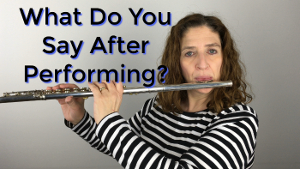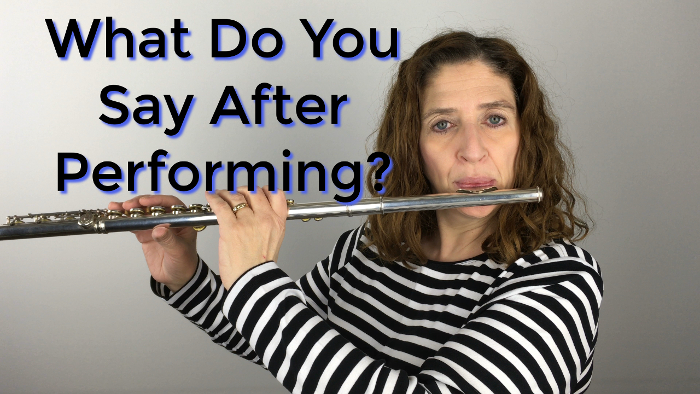What do you say when you’ve just ended a performance and someone comes up to you and says:
“Oh, great job!”
And inside you’re thinking:
“Ah, I wasn’t very good. I messed up here. I messed up there. I didn’t do this right. It’s not the best I could have done. The piano rushed!”
But what do you say to that person that is complimenting you and is so eager to see you after a performance? Well, let me tell you that the only answer to that is:
“Thank you. I enjoyed playing that too. It was great fun. I’m glad you enjoyed it.”
Always. Always, always affirm the person that is giving you this compliment and then talk about how much fun you had performing it. You don’t want to give away all your secrets, right then. Don’t say:
“I was really nervous or I flubbed up here, or, Oh, you don’t know that the piano player and I got off from each other or whew, that was bad!”
You must say “Thank you. I enjoyed performaning.” Find a way to affirm the person giving you that compliment and don’t take away from their pleasure of hearing you.
I’m sure it’s happened to everybody when someone has said, Oh nice hair and you say, well, I just rolled out of bed. They are probably very genuine that they think your hair looks really good but to you it’s a bad hair day. You didn’t do anything with it and it’s not the way you like it to be. It’s the same way with a performance.
People can enjoy a less then perfect performance, because everybody hears different things. Every persons takeaway is different from yours. You have such familiarity with every single note and an intimate knowledge of each of those pieces. But, your audience, the vast majority of the audience, doesn’t know those pieces the way you do. If they enjoyed it, then you need to say thank you and stop there. No buts. No I wishes. No anything about the secrets that happened in your head with your fingers or on the stage. You’re going to tell them how much you appreciate their compliment.
It’s okay to look at your teacher standing in the back of the crowd and lock eyes with them and the two of you can know that something occurred. But your audience doesn’t know that. There have certainly been times when I performed a piece that was not to my liking. One prime example was a recital that began with a piece called Valentine trills from a book of musical Valentines that Carol Wincenc commissioned. The short piece that I opened the recital with was all trills! Everything was a trill in that little Valentine.
Maybe in hindsight, that wasn’t the best first piece to settle my nerves in a performance. I probably should have started with something else, and then moved to that piece. I definitely showed that I was nervous. I thought that the trills weren’t even, that they didn’t come out and come across to the audience the way I wanted them to. But afterwards people said that I did a great job. They loved that piece. In my mind it was not good. However, later when I listened to that piece on the recording, I thought, wow, nothing, nothing that was going on in my head about what was wrong with that performance came out in that recording, nothing.
I thought, who is that person playing? Because it can’t be me. That really taught me a lesson. The things we hear in our head sometimes is not reality. It’s not what the audience hears. It may even not be what your flute teacher hears and you have to accept that and that’s okay. That’s okay. We all have our demons. We all go home after a performance thinking that some part of it wasn’t good. I could have done this or that better. All those things go on in our heads.
But we need to accept that we played music. People enjoyed it. So, we should enjoy it too. Accept those compliments. Know that they’re meant genuinely and feel good about that compliment. Don’t feel bad about something that may or may not have gone astray.
Now, yes, there’s those times where it was a real bomb and perhaps everybody knows because you were doing a piece for memory and you had a memory slip.
But you know what? Things like that don’t ruin an entire recital. You and your teacher maybe are the only ones that are going to be the ones that talk about it afterwards. No one else remembers that. They only remember the good. I think that’s a lesson for life to remember the good, keep that in the forefront and enjoy performing. Don’t think about the mistakes that you have made.
The next time you perform and you don’t think things went terribly well, but someone comes up and tells you how wonderful it was, that they loved your performance, your sound was great and everything else, you smile and say, “thank you. I loved performing too and I’m so glad you enjoyed that performance.” And leave it at that. Take the things that you want to say about it away, put them in the back of your head and don’t tell!
Have fun!
DoctorFlute
Watch my video of this: FluteTips 93 What Do You Say After a Performance

